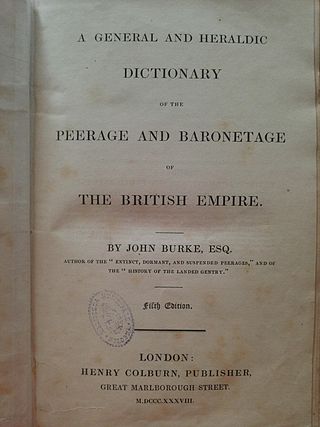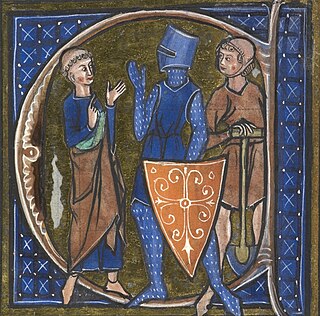
Gentry County is a county located in the northwestern portion of the U.S. state of Missouri. As of the 2020 census, the population was 6,162. Its county seat is Albany. The county was organized February 14, 1841 and named for General Richard Gentry of Boone County, who fell in the Seminole War in 1837.
Brazil is the largest country in both South America and Latin America.
Youngstown, Ohio is a city in the US state of Ohio and the county seat of Mahoning County.
Fisher is an archaic term for a fisherman, revived as gender-neutral.
Speed is the rate of motion, change, or activity.
A sleeper is a person who is sleeping.

Burke's Peerage Limited is a British genealogical publisher, considered an authority on the order of precedence of noble families and information on the lesser nobility of the United Kingdom. It was founded in 1826, when the Anglo-Irish genealogist John Burke began releasing books devoted to the ancestry and heraldry of the peerage, baronetage, knightage and landed gentry of Great Britain and Ireland. His first publication, a Genealogical and Heraldic Dictionary of the Peerage and Baronetage of the United Kingdom, was updated sporadically until 1847, when the company began publishing new editions every year as Burke's Peerage, Baronetage and Knightage.
Frederick Alton Jewell, was a prolific musical composer who wrote over 100 marches and screamers, including:

The landed gentry, or the gentry, is a largely historical British social class of landowners who could live entirely from rental income, or at least had a country estate. It is the British element of the wider European class of gentry. While part of the British aristocracy, and usually armigers, the gentry ranked below the British peerage in social status. Nevertheless, their economic base in land was often similar, and some of the landed gentry were wealthier than some peers. Many gentry were close relatives of peers, and it was not uncommon for gentry to marry into peerage. With or without noble title, owning rural land estates often brought with it the legal rights of the feudal lordship of the manor, and the less formal name or title of squire, in Scotland laird.
Maunsell is a surname, also encountered as 'Mansel', 'Maunsel', and 'Mansell', and in some cases a cognate of 'Mansfield'. Per MacLysaght, of Norman origin, and closely associated with County Limerick and County Tipperary since the seventeenth century, but on record there and County Wexford as early as the thirteenth century. It has been stated that, the name being Norman in origin, numerous families of the name existed in Northern France for some generations prior to the Norman Conquest. Several branches of the Irish family are extensively treated in Burke's Landed Gentry of Ireland.
Landing is the last part of a flight, where a flying animal, aircraft, or spacecraft returns to the ground.

The aristocracy is historically associated with a "hereditary" or a "ruling" social class. In many states, the aristocracy included the upper class of people (aristocrats) with hereditary rank and titles. In some, such as ancient Greece, ancient Rome, or India, aristocratic status came from belonging to a military class. It has also been common, notably in African and Oriental societies, for aristocrats to belong to priestly dynasties. Aristocratic status can involve feudal or legal privileges. They are usually below only the monarch of a country or nation in its social hierarchy. In modern European societies, the aristocracy has often coincided with the nobility, a specific class that arose in the Middle Ages, but the term "aristocracy" is sometimes also applied to other elites, and is used as a more general term when describing earlier and non-European societies. Aristocracy may be abolished within a country as the result of a revolution against them, such as the French Revolution.

Gentry are "well-born, genteel and well-bred people" of high social class, especially in the past. Gentry, in its widest connotation, refers to people of good social position connected to landed estates, upper levels of the clergy, or "gentle" families of long descent who in some cases never obtained the official right to bear a coat of arms. The gentry largely consisted of landowners who could live entirely from rental income or at least had a country estate; some were gentleman farmers. In the United Kingdom, the term gentry refers to the landed gentry: the majority of the land-owning social class who typically had a coat of arms but did not have a peerage. The adjective "patrician" describes in comparison other analogous traditional social elite strata based in cities, such as the free cities of Italy and the free imperial cities of Germany, Switzerland, and the Hanseatic League. The concept of gentries have often been one of aristocracy and often under autocratic hierarchies.

Richard Gentry was an American politician, slave owner, and soldier from Missouri. Gentry was killed in Florida during the Seminole Wars. The Missouri county of Gentry is named for him. He was the first mayor and founder of Columbia, Missouri.
Gardyne is a Scottish surname from the county of Angus. The family or Clan Gardyne originated in the environs of Gardyne Castle; their seat was Friockheim, Angus, Scotland.
Stinson is an English and Scottish surname. There are many variants, including Stephenson, Stevenson, and Steenson. The Stinson family first landed in Glasgow around the year 1100, from Denmark, changing their name of "Stenson" to Anglicize it.
Landed gentry usually refers to a largely historical British social class consisting in theory of landowners who could live entirely from rental income, or at least had a country estate.





